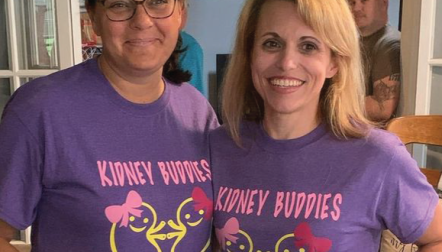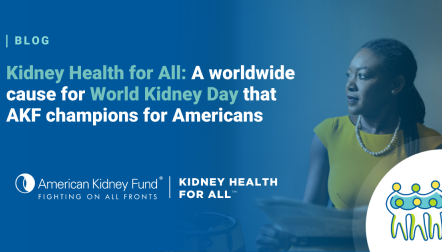
Blog post
An unsung hero of kidney disease: A caregiver's impact on managing kidney disease

November is National Family Caregivers Month, a time dedicated to recognizing and acknowledging your contributions as a caregiver who works relentlessly for your loved ones in need. Caregivers are not just professionals or a person's health care team. Often, a sibling, spouse, life partner, adult child, friend, neighbor, coworker or other family member steps into the caregiver role, providing support to a loved one as they manage kidney disease. If you are a caregiver, your help is invaluable as your loved one navigates the challenges of living with this chronic disease.
As a caregiver, you may be responsible for a variety of tasks to ensure your loved one is cared for. This may include basic tasks such as taking loved ones to appointments, shopping for groceries, running essential errands, helping your loved one bathe or cooking meals.
There are many other forms of support your loved one may need, though. The journey after being diagnosed with kidney disease involves processing a lot of new information and your support can ease the process as your loved one learns to navigate their new normal. You can accompany your loved ones to their appointments, provide emotional support and learn what to expect as they receive treatment. As a caregiver, you may often stand in as your loved one's advocate. You can ask questions about your loved one's care and ensure your loved one receives the care they need throughout their journey.
"Being a caregiver to me is being willing to drop everything and lend a helping hand. Being a caregiver is not for the weak of heart. When Quenton and I got together, I never thought I would have to be, but you would do anything for the person you love."
- Gabby Turner-Gee, Caregiver for husband, Quenton Turner-Gee
As you are providing care for your loved one, you may also be juggling a job, taking care of your family or managing other responsibilities. It can be easy to feel stressed when trying to balance these roles, which can make it challenging to find time and energy to take care of yourself. Remember that while supporting your loved one is vital to their health, without taking proper care of yourself, you will be unable to care for them.
Here are some ways you can ensure that you are taking good care of yourself:
- Ask for help when you need it and accept help when it is offered.
- Communicate with your loved ones, family and employer about what you can and can't do.
- Look for local resources to assist caregivers such as transportation assistance or state respite care.
- Make time throughout your day for breaks.
- Stay on top of your own health. Eat healthy foods, exercise regularly and keep up with doctor's appointments.
This month serves as an opportunity to show appreciation. On behalf of the 37 million people in the United States living with kidney disease, the American Kidney Fund wants to thank you for your commitment, support and love. Cheers to the support you provide that is essential to the journey of treatment and healing.




